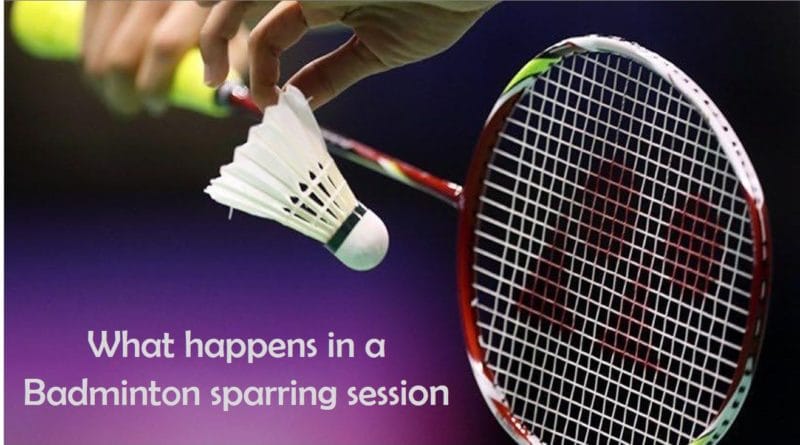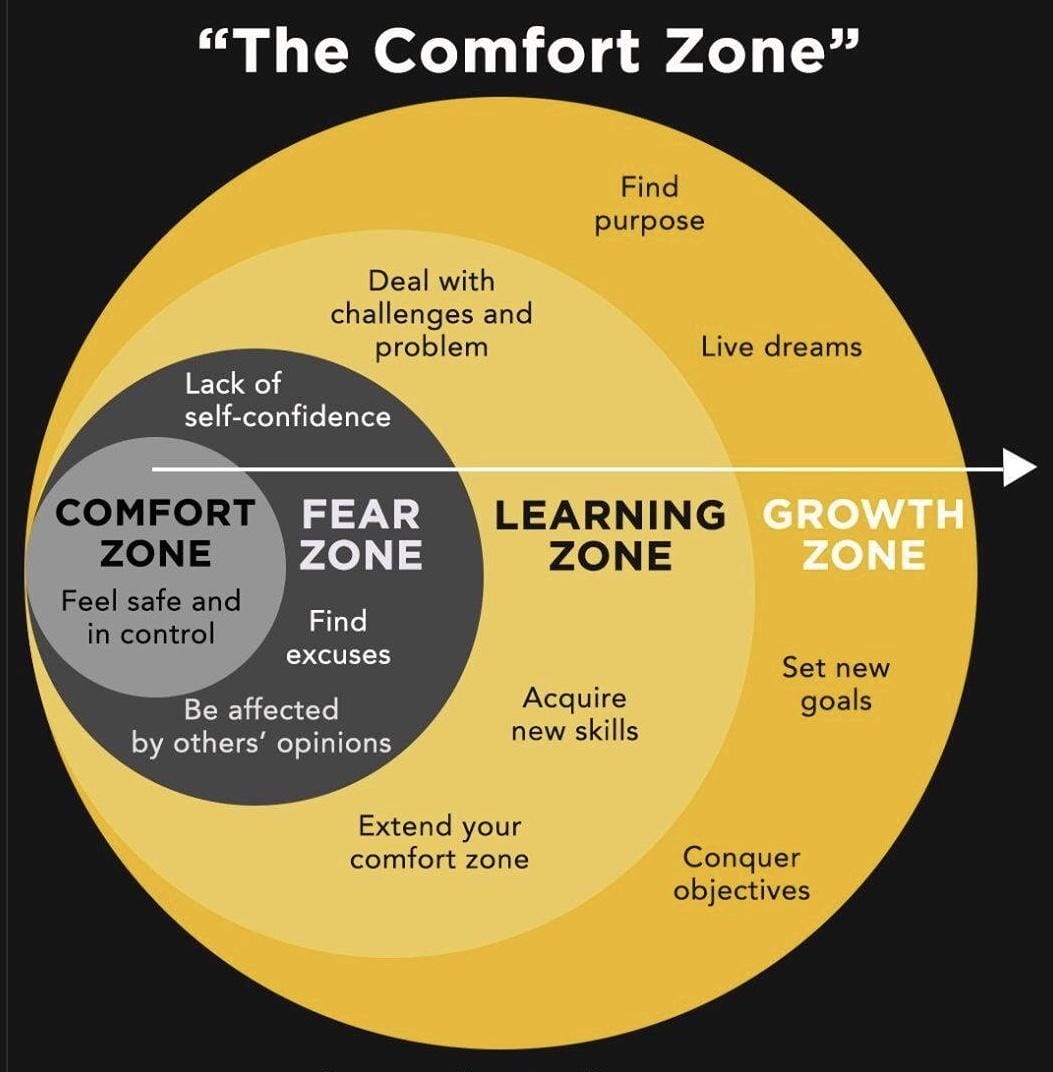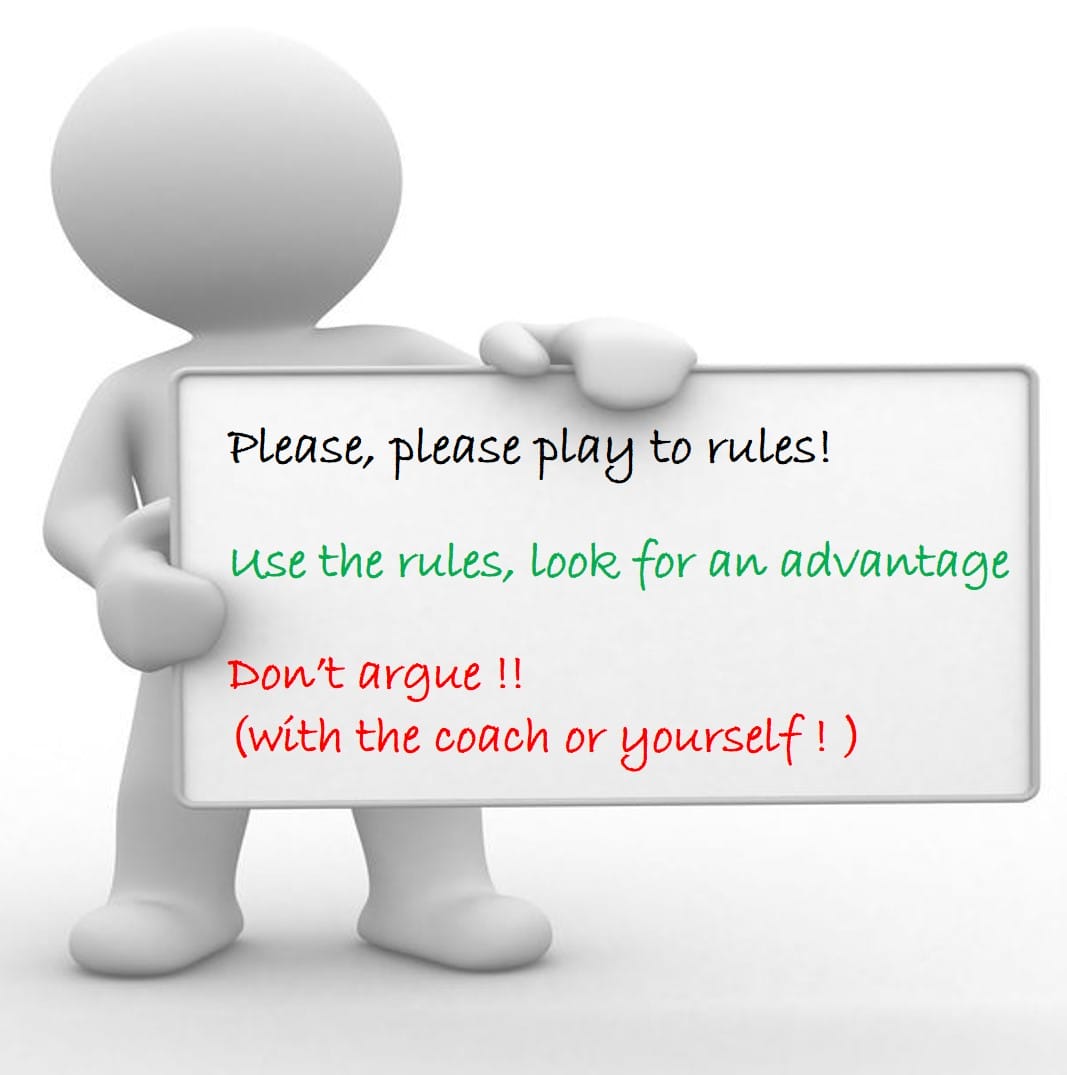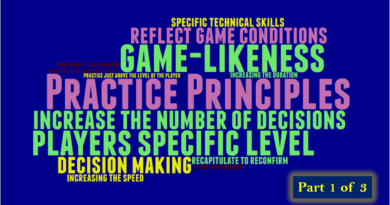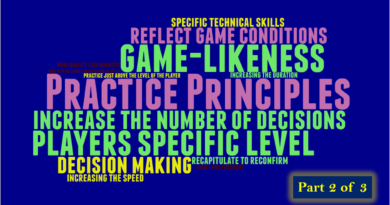6 Ways to prepare for a badminton sparring session
Have you ever been invited to a sparring session?
People tell me that it is an essential training element and a different form of practice
But what are the elements of a great badminton sparring session, it’s not just playing games!
What can you do to create your the best sparring experience?
The Badminton Coaches guide to sparring sessions
If you want to know what how to create a great badminton sparring session and the questions that coaches have been asking click on this image.
It will give you some thoughts and ideas to the obvious question, 15 of them!
- What is the purpose of sparring?
- What is the definition of competitive sparring?
- When should I play more free games?
- What is the difference between sparring and conditioned games?
- Why do my players not like some of the games, show resistance and argue?
An effective session is more than just playing matches
– – – – – – – – – – – – – – – – – –
1 What is badminton sparring – do you know?
2 It’s all about you
3 Why it’s not always about free play
4 You must be able to win points
5 Understand that there will be rules to help everyone
6 What type of games to expect – Themes, Conditioned Games, your own
– – – – – – – – – – – – – – – –
1 What is badminton sparring?
This term is used to describe many things but for me, it’s when practice moves from co-operating into a competition.
It doesn’t just have to be playing games to 21 points, it can be so much more than that. Remember, it is still a practice session (of a type) so ensure that you are still learning, even if you are not winning.
It is when you try to win more points than your practice partner, who has now become your practice opponent. This is important as now the aim is to WIN points, but may also be to STOP them from winning points.
Not all sparring sessions will be the same
It could be early in the season after a hard physical training block, maybe even part of the physical itself. It could also be pre-competition (less than 2 weeks away) before the biggest event of your season.
You may be one of the best players there and feel the need to show your position. However, that is for you to decide.
Alternatively, you could be one of the weakest (up and coming) players and need to be ready to show some resilience and grit to survive what could happen: are you ready to lose all your matches? Remember the score isn’t always a representation of how you perform.
Ensure that you understand the different types of badminton sparring
be prepared for the different themes set by the organisers
– – – – – – – – – – – – – – – –
2 It’s all about you
You need to know why you are there and what you want to get from the session.
 It’s important to bring your competition mindset to the hall. That doesn’t necessarily mean that you need to win every match, just like any tournament that isn’t normally possible. However, you must compete, no matter how you feel.
It’s important to bring your competition mindset to the hall. That doesn’t necessarily mean that you need to win every match, just like any tournament that isn’t normally possible. However, you must compete, no matter how you feel.
Sparring (or match) sessions are all about competing and learning. We can discuss all the different types of ‘competing’ in later posts 🙂
Have you thought that it’s important to be a little more selfish than you are in normal practice? This is preparation to help your competition attitude as well as test your current competition performance.
It’s practice, yes, but everyone is expecting everyone else to compete. So bring your internal competitor to the court, no matter who you are playing or the theme of the match, and be prepared to compete.
Are you the strongest player
Use the fact that you would normally win against the player there.
Have a plan in your head, maybe you are prepared to lose or have much closer games. Of course, you can certainly just play hard to win!
It’s your choice, please use it wisely, focus on winning by using certain tactics or test yourself, you could even experiment, all this is possible.
Experimenting with new different tactics or shots is much easier if you either are not threatened about the fact you might lose or you feel confident that you will win anyway. By experiment, I don’t mean trick shots I mean to try new strategies or emphasis on a certain area of your game.
For example, you could defend more by giving away the attack, or trying to play as fast as you can with good speed, or deciding to test yourself mentally by setting different targets that only you know.
Are you the weakest player?
If you are there as a weaker player invited to spar, then trying to win is a good objective especially if there are higher ranked, stronger players than you would normally play against.
Be aware that it can be mentally draining if all your games turn into defeats, but that depends on your mindset.
Use the opportunity and make it as tough as you can for all the opponents to play against you.
Deciding not to make service return errors, or limiting the number of times that you hit out the side of the court are easy targets to start with (is that possible for you over say 3 matches?). Listen to the coaches advice and if needed be prepared to act as a true sparring player and play in a style asked of you by the coach in order to help others improve.
Use the session ….
- To test your newly developed skills (Practice performance doesn’t always translate into Competition performance)
- To try out things you never would in a real competition (to play without fear)
- To test if you can expose weaknesses and poor strategies in other players (aim to test every person you play)
- To let others know that you are a ‘force to be aware of’ (it’s sometimes good to show people how good you are!)
Whatever happens in sparring sessions make sure that YOU come away with something just for you!
– – – – – – – – – – – – – – – –
3 Why it’s not always about free play
I’ve always been surprised that some players and coaches believe that badminton sparing is just playing games.
They believe that all games will be played to 21, sometimes 1, 2 or 3 sets, but this isn’t necessarily the case.
There are many reasons why the session might include alternations to rules or themes/conditions for each set of games. Be prepared to consider every change. I hope that you find a challenge and something ‘just for you’ in nearly all the games.
If you want to see examples of all the possible games look out for future posts !
You may feel happy, challenged or uncomfortable!
If you were expecting free play matches (with no alternations in scoring or tactics) don’t be disappointed if it’s different. Ok, some sessions will just be games and that’s perfectly acceptable, in fact, it’s often essential.
If it’s free play then now it’s your job to take charge, create a plan, get onto the court and perform 🙂
However, there could be alterations to free play that don’t suit you, they make you feel uncomfortable, even angry. 🙁 Be prepared for this.
I believe that it’s essential that sometimes you get these feelings, and they aren’t really always negative. Remember badminton sparring should be designed to prepare you for match play, by replicating these situations and feelings, you should feel emotional.
Reasons and your reactions (ones I’d like you to consider)
The rules (conditions) favour your opponent and not you ... make them work extra hard to win the game, relax, wait for games that favour your style and mindset. Can you get just 10% of something from this match?
The tactics asked for do not suit your preferred style of play … I’d hope that you already have a range of styles that you can play. Decide if this game could become something you could adapt against certain opponents, in certain situations and conditions. You must have more than 1 style 🙂
It’s something new that you have not tried before: … this is easy! Why complain until you have experienced it. Then complain or get angry by yourself if you want. It probably won’t help you but if you enjoy getting angry at yourself, go for it 🙂
You think that it’s a ‘stupid rule’ (your words not mine!) … talk with the coach and ask them to explain why the rules (conditions) are important and how they will help players in a real competition. Be aware that not every game can be justified!
If the sparring is just before an important event be aware of your feelings,
the style of matches (the conditions) may not suit you however you can still control your mindset
– – – – – – – – – – – – – – – –
4 You must be able to win points
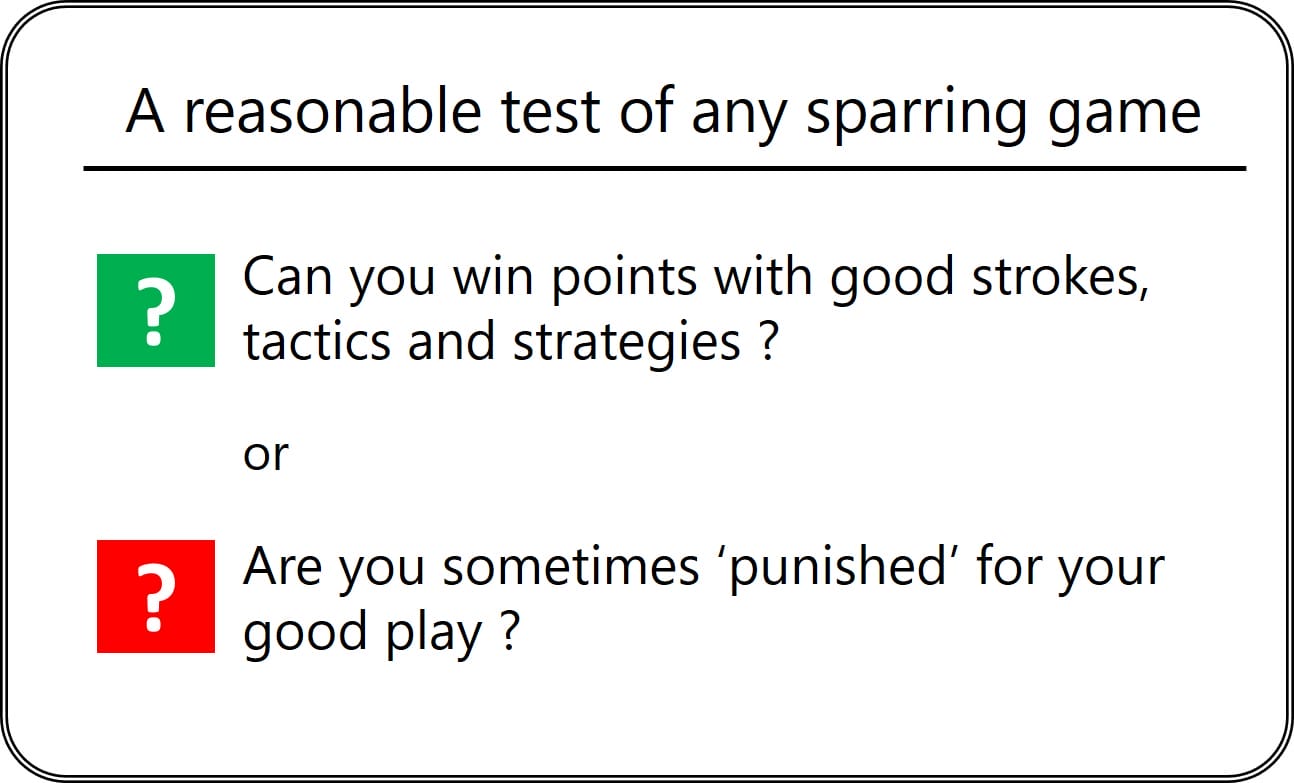 During all the games you must feel like you are in a competition and be able to win points.
During all the games you must feel like you are in a competition and be able to win points.
This may sound obvious but it doesn’t always happen!
Sometimes coaches and organisers ‘over condition’ sparring matches and they end up too complex or with ridiculous rules that prevent you from winning points when you’ve played well.
If you’d like examples of these games then click on this link and read the Coaches Guide to Badminton Sparring Sessions. You’ll find examples of games that I think are great for sparring sessions, games that have limitations or games that are just worth playing, possibly even harmful to the player and session cohesion.
Sparing sessions should be seen as problem solving days, not just playing days
What can you do to identify solutions to the situations you face in these games?
How to play and win
Firstly you have to decide what ‘winning’ is, what it means to you in that session. There are so many subtle variations of winning, especially in practice sparring match sessions.
How many variations of winning can you think of? – Winning isn’t having the most points, although of course, it could be. I’d like to think of at least 3 other ways that you could ‘win’ in a badminton sparring session. Your thoughts may have to become a little abstract, but at least they will be yours.
If the game is free play – It’s practice, so decide how you want to play. You certainly don’t need to tell anyone your thoughts, but you must have thoughts! Remember this is your opportunity to play as you wish without the fear of losing (as in a tournament).
I recommend that if you know your opponent, you should decide how you want to use the time on the court. You’ll have an idea of how the matches normally go against this player. Therefore set some quiet internal goals and set out trying to achieve them. Ok, I haven’t told you any examples of goals, because it’s up to you to find them.
If the game has conditions – listen to them carefully, look for opportunities to win points or at least stop your opponent from winning points. I would hope that you know what style of play generally suits you and you are able to consider if this conditioned game is one that you’ll excel at.
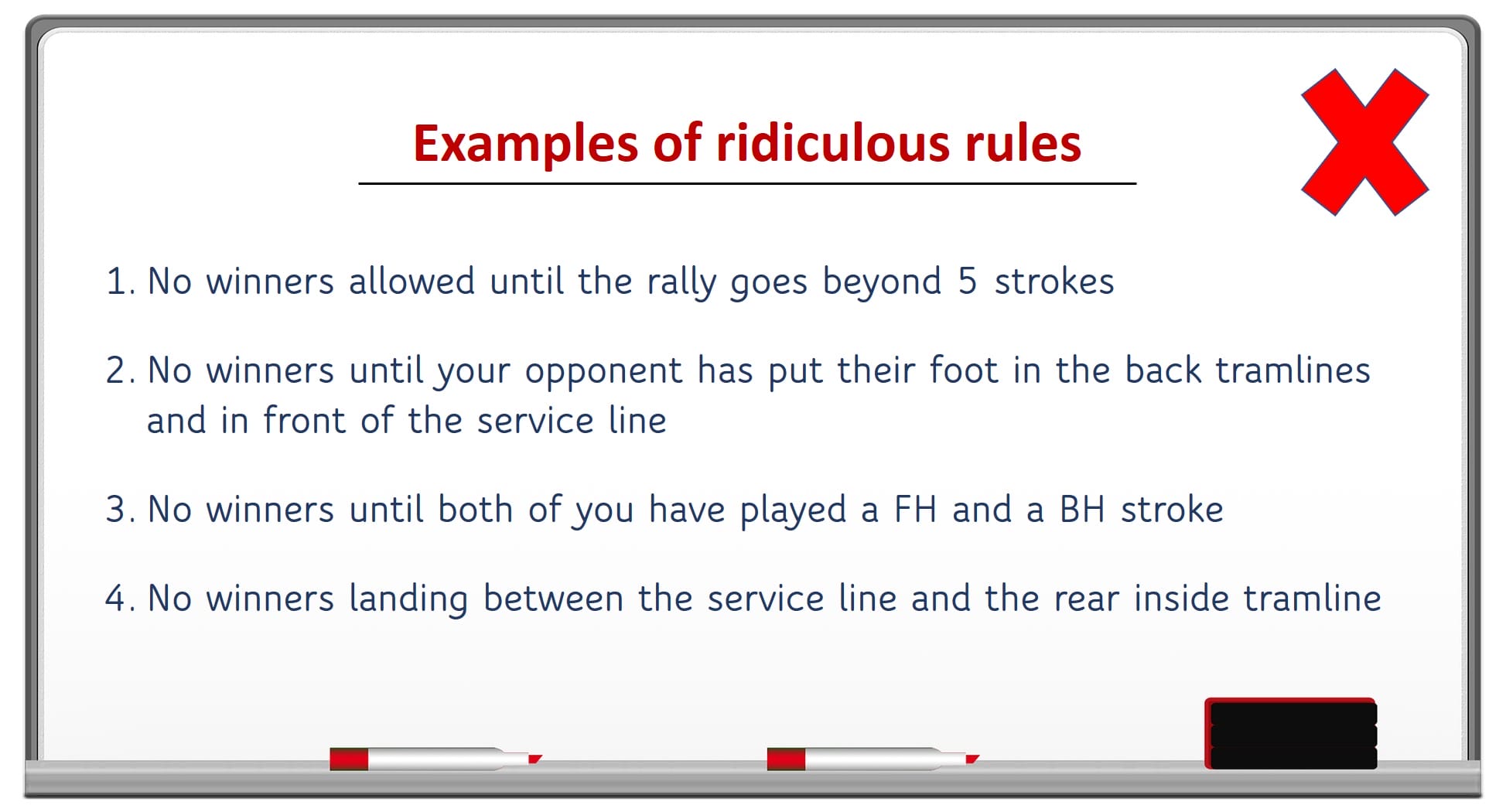
– – – – – – – – – – – – – – – –
5 Understand that there will be rules to help everyone
I’d expect the coach or the organiser to set out some rules at the start.
Listen to them, understand the format, and decide on a strategy for each game. Is it one that immediately favours your style, or is it one that you will have to work hard just to stay competitive, never mind winning it?
Please, please, please play to the rules!
I’m sure that within the most reasonable rules (conditions) there are opportunities for everyone to learn and develop. You may have to work hard to find them, but it’s an enjoyable challenge – well I think so!
If you find that there is a rule that you have never heard before, don’t panic. Just because it’s new to you doesn’t mean that it will not favour you. Relax, breathe, consider the opportunities and only then ask a question if you need to.
However, don’t argue with the Coach or Organiser, it’s not worth the hassle
The rules should you allow to experience and play as if in a competition
If not ask why 🙂
– – – – – – – – – – – – – – – –
6 What type of games to expect – Themes, Conditioned Games, your own thoughts
There are so many different ways to run a badminton sparring session someone should write a book!
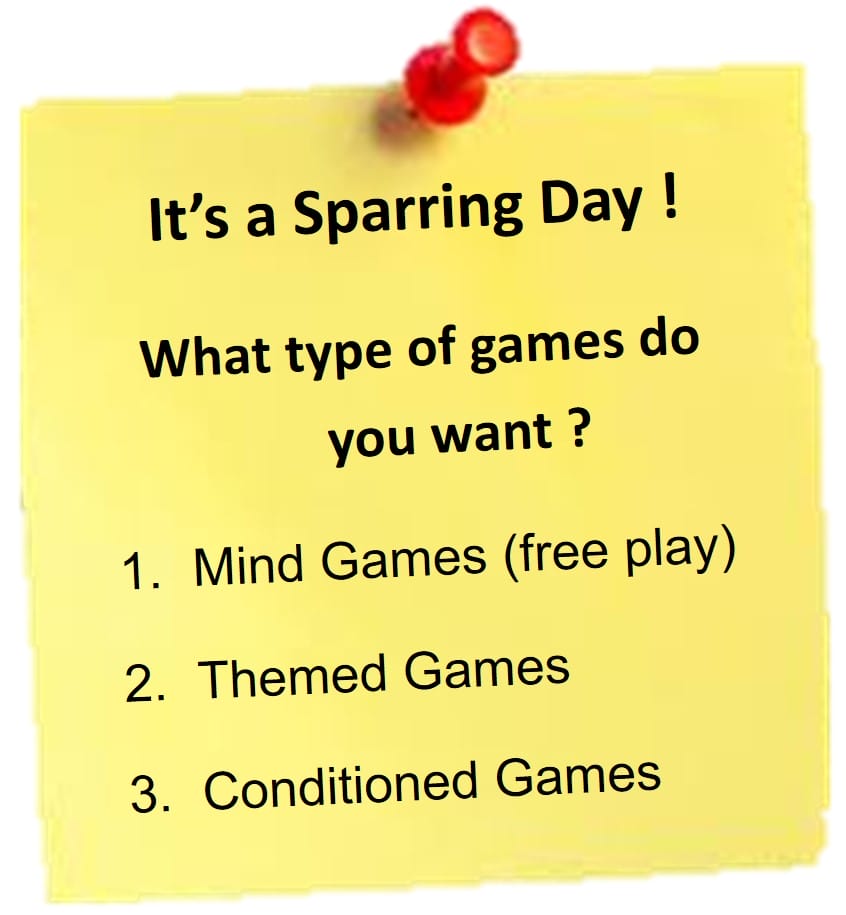 The games can vary from free play all the way through to heavily conditioned games that may not make sense to everybody.
The games can vary from free play all the way through to heavily conditioned games that may not make sense to everybody.
In later posts, I’ll give examples of games that could be played, plus the reasons behind them. You will be surprised by how many subtle variations coaches use when creating games.
My advice
Be prepared for different games, but really it’s all about how you can manipulate your tactics, create stress in your opponents, manage your own stresses and if they are there, win the bonus points.
Then within every game, there are the ‘hidden’ thoughts of each player. How you react to a game and the thoughts you have can easily create even more games within each.
Ultimately, a game is just a race to see who masters the situation. No matter what game you are given (apart from those in no.4) you must be prepared to find a way to win points or not lose them.
The same applies to free-play games as the opponent should be all you need to give you a challenge.
I’ve known players to condition/restrict themselves if in ‘Free Play’ games.
No one knew except them and they did it for their own positive reasons
– – – – – – – – – – – – – – – –
I’d really like to know what you think are the components that make a great badminton sparring session.
Are they similar to the ones above, if not, please send me some thoughts and ideas?
It only takes a click to send an email to contact@badmintonandy.com
– – – – – – – – – – – – – – – – – – – – – – – – – – –
If you want to read more about sparring & consider some coaches questions click on this image
It’s a longer post, but full of examples, ideas and warnings!
Initially, it was written for coaches but I’m sure players will gain something or at least an insight into what coaches are thinking about when they say “Today is Sparring!“

